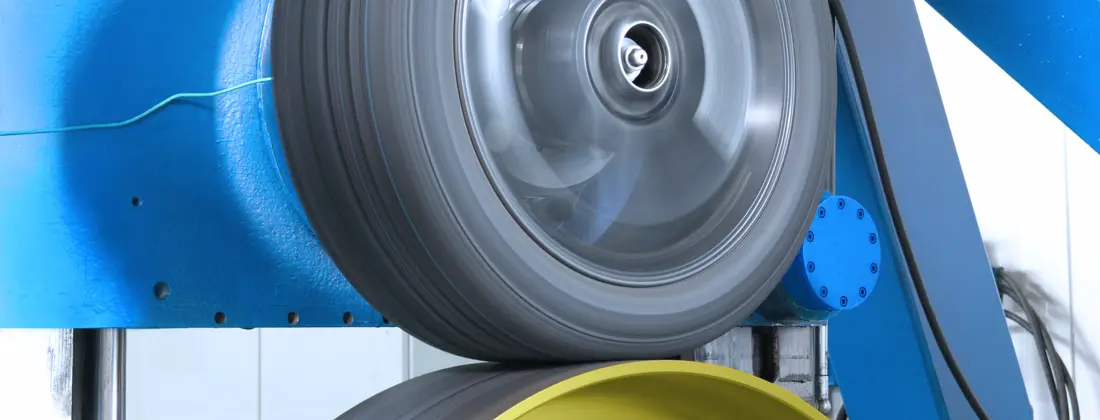JIS D4232 Truck Tyre Load Performance Testing
The JIS D4232 standard is an essential guideline in Japan for ensuring that truck tyres are capable of withstanding the required load and maintaining safety under specific conditions. This testing procedure evaluates the load-carrying capacity, deformation, and stability of truck tyres when subjected to various loads.
This test is critical for ensuring compliance with international standards and meeting customer expectations regarding tyre performance and reliability. The JIS D4232 tyre load performance test involves subjecting a tyre specimen to increasing weights until it reaches its maximum load-carrying capacity or deformation limit, whichever occurs first. This process helps manufacturers identify the optimal load-carrying capability of tyres under different conditions.
The test setup includes a controlled environment where the tyre is mounted on a suitable wheel and positioned in a calibrated testing machine. The machine applies incremental loads to the tyre until it reaches its specified maximum load or deformation point. During this process, various parameters such as inflation pressure, temperature, and angle of attack are monitored closely.
Understanding the importance of this test requires an appreciation for how truck tyres contribute to road safety and operational efficiency in automotive transportation. Truck tyres are subjected to immense stress during their service life, especially under heavy loads and varying environmental conditions. Ensuring that these tyres can perform reliably is crucial for preventing accidents and maintaining traffic flow.
The JIS D4232 standard ensures that tyre manufacturers adhere to strict guidelines when designing and producing truck tyres. By following this standard, they can ensure that their products meet the necessary safety requirements set by regulatory bodies worldwide. This includes compliance with ISO 18866:2015 for passenger car tyres and other relevant international standards.
Implementing JIS D4232 testing also benefits tyre users by providing assurance about the quality and reliability of their purchased products. For quality managers, compliance officers, R&D engineers, and procurement personnel involved in selecting suitable truck tyres, this test is an essential tool for verifying that the chosen tyres meet all necessary specifications.
At Eurolab, we use advanced equipment to conduct JIS D4232 testing with precision and accuracy. Our state-of-the-art facilities enable us to simulate real-world conditions accurately, ensuring reliable results that can be trusted by clients across various sectors.
Eurolab Advantages
At Eurolab, we pride ourselves on offering unparalleled expertise in tyre testing services. Our team of experienced engineers and technicians is dedicated to delivering high-quality results for our clients. Here are some key advantages that set us apart:
- Accurate & Consistent Results: Utilizing cutting-edge technology ensures consistent accuracy across all tests.
- Comprehensive Reporting: Detailed reports provide insights into the performance characteristics of each tyre sample tested.
- Customized Solutions: Tailored testing protocols cater to specific client needs and requirements.
- International Compliance: Our services comply with global standards, including JIS D4232 for truck tyres.
- Experienced Staff: Skilled personnel ensure efficient and effective execution of tests.
- State-of-the-Art Facilities: Modern laboratories equipped to handle diverse testing scenarios.
- Rapid Turnaround Times
We understand the importance of timely results, which is why we strive to deliver accurate reports quickly while maintaining quality standards. By choosing Eurolab for your tyre load performance testing needs, you can trust that every aspect of the process will be handled professionally and efficiently.
Quality and Reliability Assurance
- Consistent Compliance with Standards: Ensuring all tests adhere strictly to JIS D4232 guidelines guarantees consistent results across multiple samples.
- Advanced Equipment: The latest testing machines provide precise measurements, enhancing the accuracy of load performance data.
- Robust Data Analysis: Sophisticated software tools help interpret complex datasets generated during tests, leading to more informed decision-making processes for clients.
The combination of these factors ensures that Eurolab consistently delivers reliable and accurate test results. Our commitment to quality control extends beyond just the technical aspects; it also encompasses ensuring that all personnel involved in conducting tests are trained thoroughly according to international best practices.
By selecting Eurolab as your partner for JIS D4232 tyre load performance testing, you can be confident that every step of the process—from specimen preparation through final analysis—will meet or exceed industry expectations. This level of precision is crucial for maintaining confidence in both product quality and customer satisfaction.
Environmental and Sustainability Contributions
- Eco-Friendly Testing Procedures: Eurolab employs environmentally conscious practices during testing to minimize waste generation and energy consumption.
- Sustainable Materials: Where possible, we use sustainable materials in our laboratory operations, reducing our carbon footprint.
- Energy Efficiency: Our facilities are designed with energy efficiency in mind, utilizing state-of-the-art equipment that consumes less power without compromising on performance.
In addition to these measures, Eurolab actively participates in initiatives aimed at promoting environmental stewardship within the tyre manufacturing industry. By adhering to strict standards like JIS D4232 and continuously improving our practices, we contribute positively towards sustainability goals.
Choosing Eurolab for your tyre load performance testing not only ensures compliance with international regulations but also supports efforts towards a greener future. Our dedication to environmental responsibility reflects our commitment to delivering exceptional services while minimizing negative impacts on the environment.





